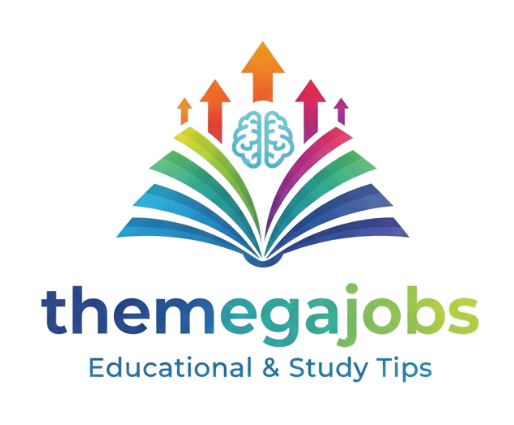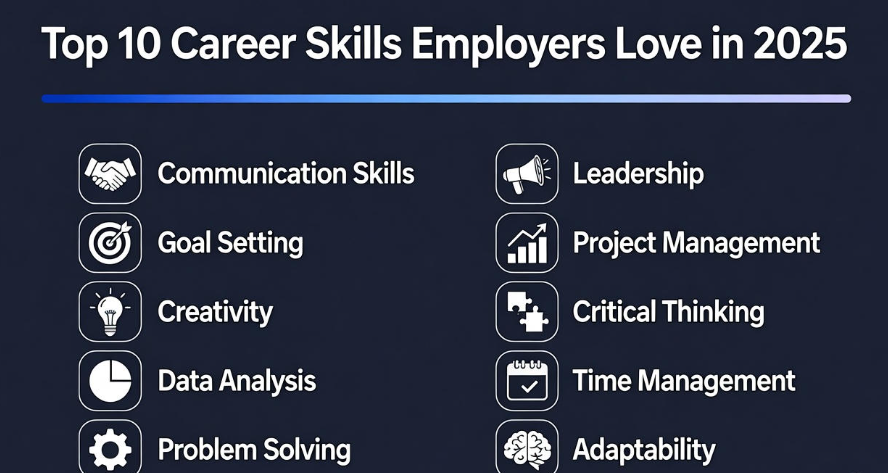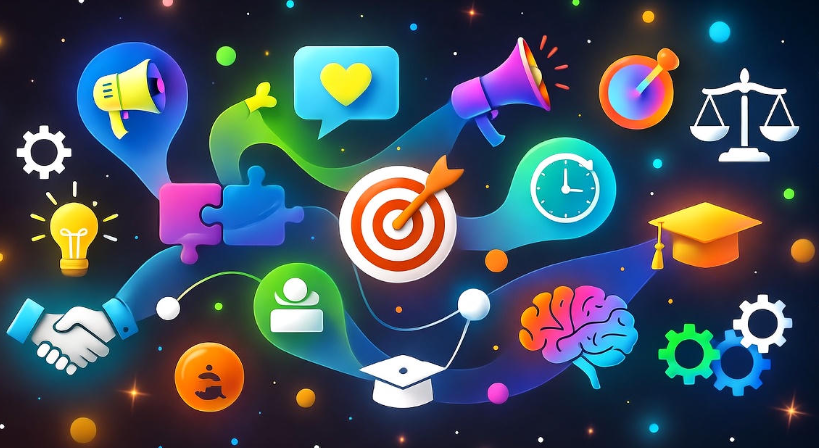In today’s fast-changing job market, having a degree alone isn’t enough. Employers are looking for people who can adapt, communicate, and think creatively. Whether you’re starting your career or planning a shift, knowing the skills that matter most in 2025 can give you an edge.
Here are the top 10 career skills employers love this year, along with tips on how to develop them.
1. Digital Literacy and Tech Savvy 💻
Technology is everywhere, and employers want employees who can navigate it easily. But digital literacy isn’t just about knowing how to use a computer—it’s about understanding digital tools, cloud software, and even basic coding.
-
Learn to use collaboration tools like Slack, Trello, and Zoom.
-
Understand data privacy, cybersecurity basics, and AI tools.
-
Keep up-to-date with new apps in your field.
Tip: Even if your role isn’t in IT, being comfortable with digital platforms will make you more valuable.
2. Emotional Intelligence (EQ) ❤️
Emotional intelligence is the ability to understand and manage your own emotions—and respond to others’ feelings appropriately. In 2025, companies value EQ as much as IQ.
-
Practice empathy when working in teams.
-
Handle conflicts calmly and professionally.
-
Pay attention to body language and tone.
Why it matters: Employees with high EQ are better team players and can handle stressful situations without drama.
3. Critical Thinking and Problem-Solving 🧠
Employers want people who can analyze a situation, weigh options, and make smart decisions. Problem-solving is not just for managers—it’s important at every level.
-
Break down problems into smaller parts.
-
Consider multiple solutions before acting.
-
Learn from mistakes instead of repeating them.
Fun fact: A 2024 survey found that 72% of employers prioritize problem-solving skills over technical expertise.
4. Adaptability and Flexibility 🌊
The workplace is evolving fast. New tools, remote work, and global teams mean employees must adapt quickly.
-
Be open to changing your approach.
-
Accept feedback as a chance to improve.
-
Take on new roles or responsibilities with a positive attitude.
Pro tip: Employers love people who can pivot without panic when plans change.
5. Communication Skills 🗣️
Clear communication—both written and spoken—is still king. But in 2025, this includes digital communication skills too.
-
Write concise emails and reports.
-
Speak confidently in meetings or presentations.
-
Use visuals like charts and slides to make ideas easier to understand.
Quick hack: Practice active listening—repeat what others say in your own words to show understanding.
6. Creativity and Innovation 🎨
Companies need new ideas to stay ahead. Creativity isn’t just for designers—it’s for anyone who thinks outside the box.
-
Suggest new approaches or processes.
-
Look for inspiration outside your field.
-
Don’t be afraid to experiment and fail.
Table: Creativity in Action
| Skill | Example | Impact on Career |
|---|---|---|
| Idea Generation | Brainstorm new marketing strategies | Can lead to promotions |
| Experimentation | Test a new software workflow | Improves efficiency |
| Collaboration | Work with cross-department teams | Builds reputation as innovator |
7. Leadership and People Management 👑
Even if you’re not in a managerial role, leadership skills are important. Employers want people who can inspire, motivate, and guide others.
-
Take responsibility for projects.
-
Mentor junior colleagues.
-
Stay calm under pressure and make fair decisions.
Pro tip: Leadership isn’t about titles—it’s about influence and trust.
8. Data Literacy and Analytics 📊
Data drives decisions in almost every industry. Understanding how to read, analyze, and apply data is a huge advantage.
-
Learn basic Excel, Google Sheets, or data visualization tools.
-
Understand metrics and KPIs relevant to your role.
-
Ask questions about trends, not just numbers.
Fun fact: Jobs requiring data literacy have grown 30% in the past three years.
9. Time Management and Organization ⏰
Being productive and organized makes you reliable. Employers value people who can manage multiple tasks without stress.
-
Use planners or apps to prioritize tasks.
-
Break work into smaller, manageable pieces.
-
Avoid multitasking too much—it can reduce quality.
Tip: Showing that you can meet deadlines consistently sets you apart.
10. Networking and Relationship Building 🤝
Connections matter. In 2025, building a strong professional network can open doors faster than a resume alone.
-
Attend events and webinars in your industry.
-
Maintain LinkedIn connections.
-
Offer help to colleagues before asking for favors.
Why it works: People hire people they trust and like, not just those with skills.

Quick Summary Table: Top 10 Skills Employers Love
| Skill | Why It Matters | How to Improve |
|---|---|---|
| Digital Literacy | Navigate tech tools | Take online courses |
| Emotional Intelligence | Handle emotions, work with teams | Practice empathy |
| Critical Thinking | Solve problems effectively | Analyze situations |
| Adaptability | Adjust to change | Be open-minded |
| Communication | Share ideas clearly | Practice speaking/writing |
| Creativity | Innovate & add value | Brainstorm & experiment |
| Leadership | Inspire & guide others | Take initiative |
| Data Literacy | Make data-driven decisions | Learn Excel/analytics |
| Time Management | Meet deadlines efficiently | Use planning tools |
| Networking | Build professional relationships | Attend events & connect |
FAQs
Q1: Do I need all these skills to get a job in 2025?
Not all at once, but having a mix of technical and soft skills makes you highly employable. Focus on 2–3 skills to start and gradually expand.
Q2: How can I improve emotional intelligence?
Pay attention to your reactions, ask for feedback, and practice empathy in daily conversations.
Q3: Are digital skills only for tech jobs?
No. Every role now uses some form of technology—from marketing tools to project management apps.
Q4: Can networking really help my career?
Absolutely. Many job offers come from connections rather than online applications. Building genuine relationships is key.
Q5: How long does it take to develop these skills?
It varies. Some skills, like digital literacy, can improve in weeks. Others, like leadership or emotional intelligence, take months or years of practice.
In conclusion, the workplace of 2025 values more than just technical know-how. Adaptability, creativity, emotional intelligence, and communication are just as important. Start small, focus on improving one skill at a time, and keep learning. Employers notice people who are not just skilled—but ready to grow with the company.





